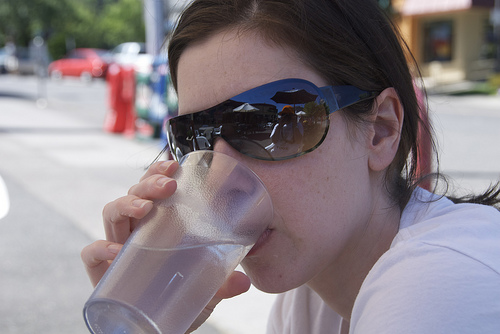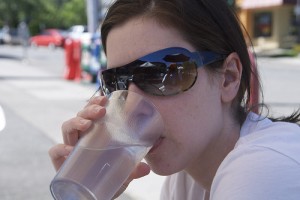
 In the medical world, it’s called “xerostomia” (pronounced zeer-o-STO-me-uh.) In the cancer world, it’s more likely referred to as, “What the devil happened to my saliva?”
In the medical world, it’s called “xerostomia” (pronounced zeer-o-STO-me-uh.) In the cancer world, it’s more likely referred to as, “What the devil happened to my saliva?”
A common side effect of cancer treatments, dry mouth is more than just an inconvenience. Saliva normally keeps acid levels down in the mouth, protecting teeth. Without it, teeth are more susceptible to decay, and gums at a higher risk for disease. Saliva also does other great things, like break down foods for easier digestion, assist in swallowing, help us talk clearly, protect the inside of the mouth and throat, and enhance the ability to taste.
If you’ve got dry mouth, you probably already know it, but here are a few signs: the mouth feels dry, like you’ve been on the desert for days; the saliva you do have may feel thicker than normal, or rope-like; your tongue may feel sore; you may be more sensitive to acidic and spicy foods; and you may have trouble swallowing.
Fortunately, there are a lot of things that will lessen discomfort and prevent damage. First of all, take care of your teeth. Brush at least twice a day, and use a fluoride rinse or gel to strengthen enamel. If your mouth is too sensitive for brushing, use foam pads. Ask your dentist about mouthwashes, toothpastes, and moisturizing gels that are made for dry mouth. We like toxin-free brands like Miessence. (Avoid mouthwashes with alcohol-they can cause additional dryness.)
You can ask your doctor about artificial saliva products, or you may find some over-the-counter rinses or sprays. There are also drugs available that increase saliva. (Salagen and Evoxac are the main ones.) However, we like to recommend more natural solutions, so try these ideas first. Drink a lot of water. Carry it with you so you can sip on it almost constantly, and keep a glass or bottle by the bed. Some sufferers suggest adding vanilla extract or a few crystals of drink mix in the water. Suck on sugar-free candies, ice chips, and sugarless gums to stimulate saliva flow. Wet your foods down with gravies, sauces, light creams, and butter, and choose lukewarm and cool foods over hot. Avoid salty, dry foods like cookies, chips, and dried fruit, and stay away from drying alcoholic and caffeinated drinks.
Some other ideas you may not have thought about: use a humidifier in your bedroom, and consider acupuncture. A humidifier moistens the air, reducing the dryness that occurs when you sleep. As for acupuncture, there is a treatment specifically for dry mouth. “Each acupuncture treatment includes electrical stimulation,” says JohnRay of Cancer Compass. “After 15-30 minutes with the stimulation, everything is removed and I’m noticing more saliva flow. It has been money well spent for my recovery.” A recent small pilot study at the University of Texas shows great promise for acupuncture’s ability to reduce the symptoms of dry mouth.
Finally, MotherNature.com recommends Echinacea dropped in juice, evening primrose in a capsule, red pepper added to foods, and multiflora rose tea.
Please share any great treatments for dry mouth.
Photo courtesy of Curtis Gregory Perry via Flickr.com.

